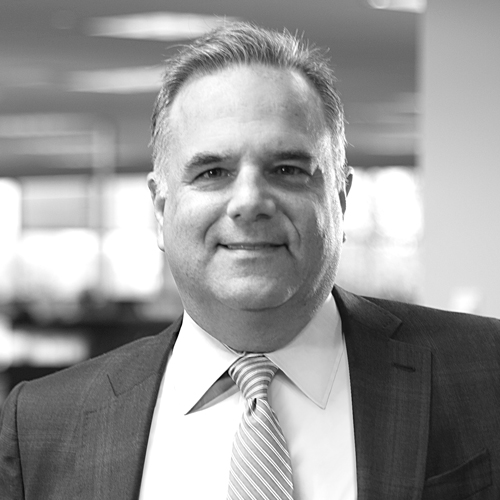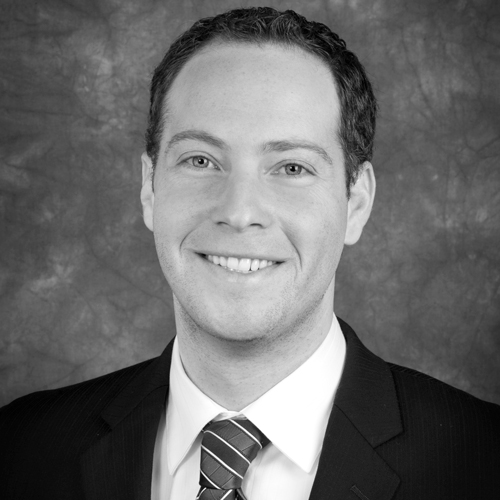T.J. Griffin has an especially unique level of insight into the impact of his work. He knows it makes a difference because he grew up watching it in action. The chief pharmacy officer of Louisville, Kentucky-based pharmacy services company PharMerica has seen his own family rely on acute caregivers and the medicines they provide.
Not only were science and math Griffin’s two best subjects growing up, but he also dated the daughter of the pharmacist in his small Illinois hometown. “I got to know him and his business and how respected he was in the community,” Griffin recalls. “He was really a caretaker of the community. We ended up getting along better than his daughter and I did.”
Griffin knew he wanted to work in healthcare at an early age, but he didn’t decide on pharmacy school until after his family went through several health-
related hardships. The first was the paralysis of Griffin’s grandfather. Given just six months to live due to ensuing complications, he lived another six years instead. Griffin’s grandmother became the primary caregiver and a regular customer at the local pharmacy. Griffin remembers her story about two pharmacists there who essentially saved his grandfather’s life.
“My grandfather was always in pain, and these pharmacists kept making him stronger medication to the point where they couldn’t make it any stronger,” Griffin says. “They knew something wasn’t right, put two and two together, and found out that the nurse was watering down the pain medicine.”
That story showed him how vital pharmacists were, and after high school, he enrolled in pharmacy school at the University of Iowa. After graduating, he moved to Florida to take a job with Eckerd, the same company for which the two pharmacists had worked.
“As I progressed through that company, I would tell that story of the two pharmacists to folks who worked with me,” Griffin says. “You need to go back and get to know your customers. There was a reason my grandmother needed help. There’s more to the story.”
“I want to make sure medication therapy is not a reason patients have to stop what they’re doing.”
Griffin spent thirteen years at Eckerd, until another family trauma redirected his career path. Within a week of discovering his mother-in-law was seriously ill in 2003, he got a call from PharMerica.
“To tell the truth, I didn’t know what a long-term care pharmacy was at the time,” he says. “I had the interview and felt like it was divine intervention to be able to bring my wife and son to be near my mother-in-law. I got a full education right away on hospice care and how caring and loving long-term and hospice care nurses are. They’re really the unsung heroes of medicine.”
Griffin’s mother-in-law passed away months after he joined PharMerica, but unfortunately, he wasn’t done getting a firsthand look at long-term acute care. In 2006, his father-in-law fell into a coma for six weeks and passed away after one day of lucidity. Then, in 2013, Griffin lost his father to complications from throat cancer.
“[My father] was in and out of nursing facilities, as well,” Griffin says. “The first one where I visited him, I looked at his chart and the IV hanging there and realized it was the wrong one. It was an underdose for my father. I was more worried about the other patient, who had double the dose he required.”
Those family experiences are never too far from Griffin’s mind. Knowing how much work and pressure nursing facility staff face pushes him to ensure the utmost accuracy on every dose PharMerica pharmacies produce. “Our customers rely on us, and we want to limit medication reconciliation issues, which data links to higher costs and higher hospital re-admissions,” he says. “I want to make sure medication therapy is not a reason they have to stop what they’re doing.”
PharMerica currently has ninety-three pharmacies in forty-six states and a team of about 3,000 employees, including about 200 consultant pharmacists who review all aspects of every patient’s medical chart and therapy.
“Our culture is one of care, commitment, and collaboration, which means best-in-class patient care and a deep commitment to our clients’ success. On top of all the daily dispensing our pharmacies do, we’re hands-on in helping nursing homes stay regulatory compliant,” Griffin says.
Monitoring compliance in forty-six different states isn’t easy, he explains. To manage it, he receives daily legislative updates through e-mail. “They’re not always about law changes, but I know what’s being talked about as a potential law or regulatory rule changes,” he says.
And, in each state, a PharMerica pharmacy director serves as the point person with the state board of pharmacy, attending quarterly meetings and gathering information. The company also has its own compliance department that tracks changes in nursing home law.
“We’re active in making sure we can be a voice with our nursing home partners if there’s a change in how they operate,” Griffin says. “We want to be a voice with them to make sure rules and regulations make sense and don’t inadvertently affect our ability to have good patient outcomes.”
To manage all this work effectively, Griffin surrounds himself with a knowledgeable team that share responsibilities. PharMerica has thirteen regional pharmacy directors and three VPs of operation who oversee anywhere from five to eight pharmacies each.
“There’s no way you can do a good job if you’re overseeing thirty pharmacies, filling as many prescriptions as we do,” Griffin says. “We have over one hundred separate clinical and service metrics we monitor to ensure we can provide best in class care and service.”
Griffin’s latest focus is the company’s antimicrobial stewardship program, which is an effort to stop the spread of drug-resistant super viruses that are becoming alarmingly more common.
“Hospitals have had these types of programs for years. Now that nursing homes are becoming more like mini-hospitals, they need these programs, too,” he says.
Griffin says that he wants his team to measure the use of antimicrobials to extend their effectiveness. “You have got to select the optimal drug regimen for the right outcomes,” he notes. “You can’t just throw big-gun antibiotics at a microbe that may still not be resistant to a first-line therapy.”
Soon, Griffin explains, those antibiotics won’t work anymore, allowing that microbe to spread. For the type of end-consumer PharMerica most often serves, the elderly, this outcome is particularly ominous. “Our role is to focus on diagnosis, communicating among the healthcare providers, nursing facilities, and pharmacists,” Griffin says. “Then, it’s selecting the right drug, the proper dosing, and proper duration. We create an accountability structure.”
Education, either on-site or via PharMerica’s online portal, is another key aspect of the program, Griffin explains. He knows better than most that it’s better to learn that way than by experiencing problems firsthand. Griffin has been through it, and because of that, he hopes that fewer people will in the future.


